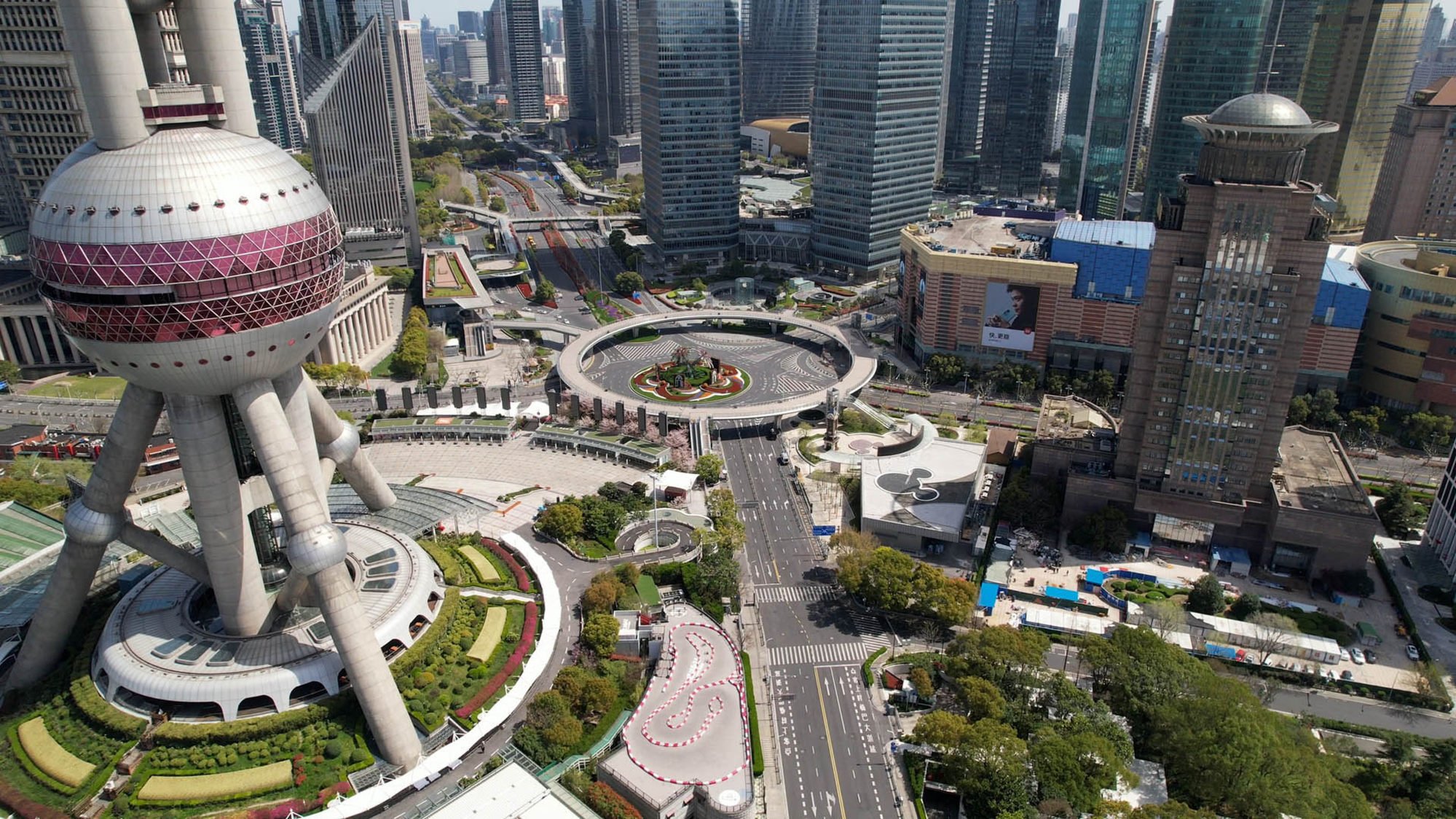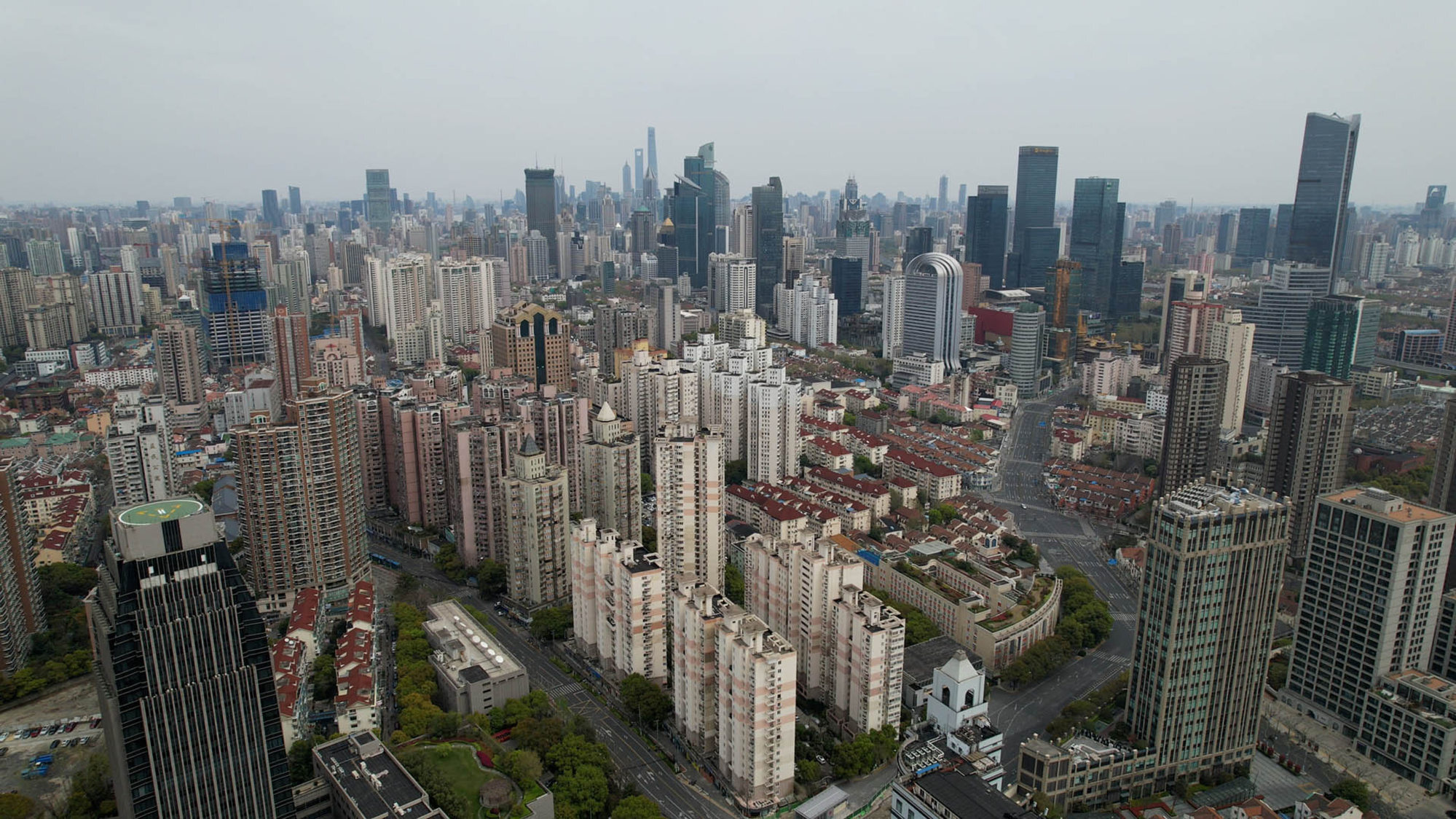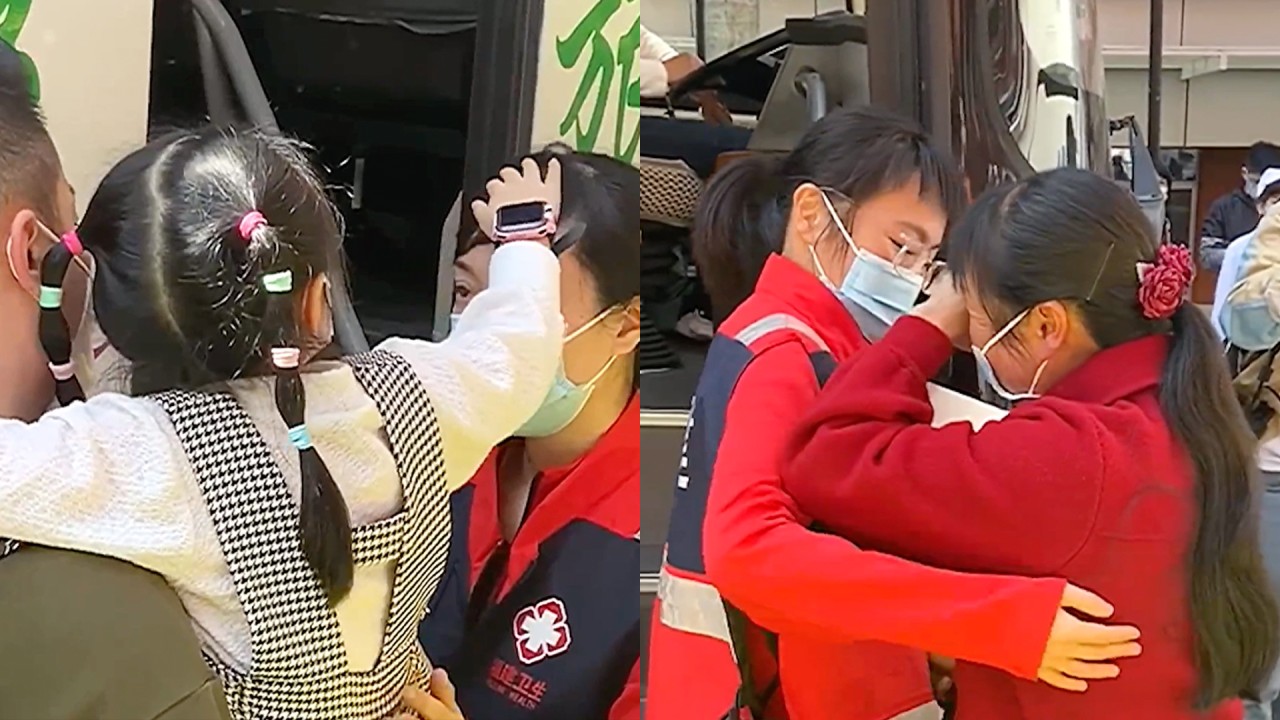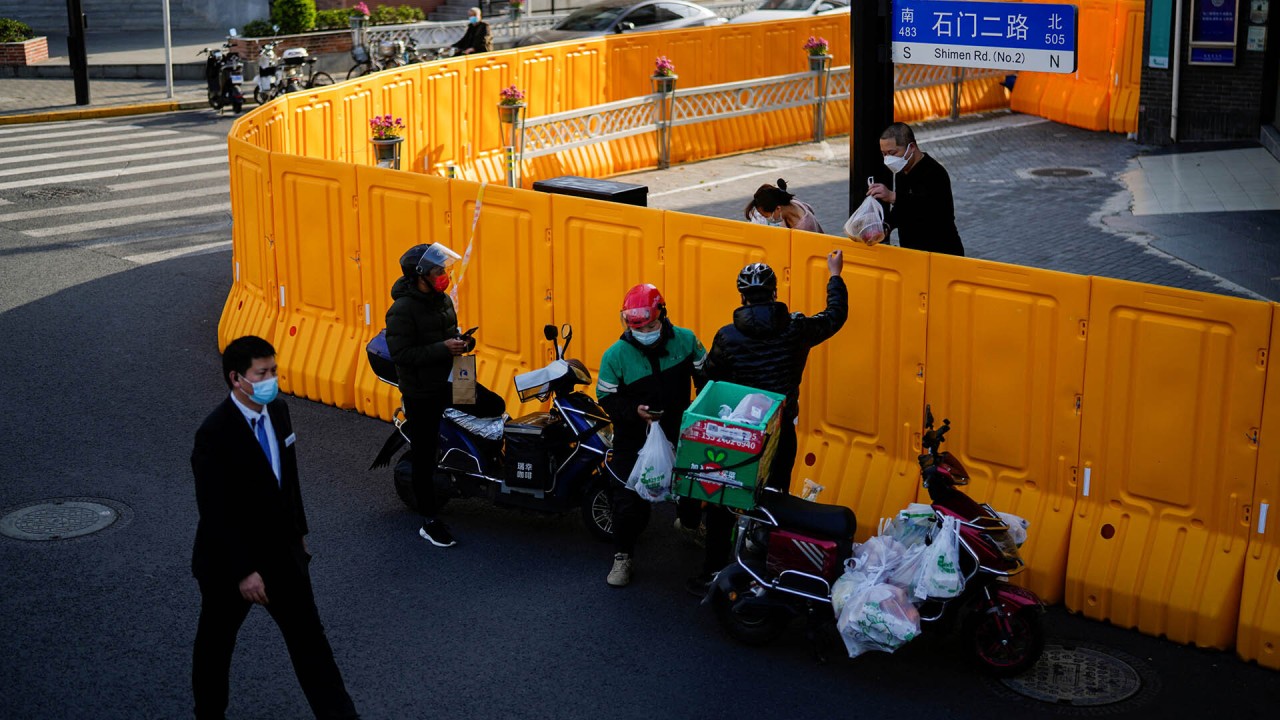
Voices from the ground: Shanghai’s lockdown through the eyes of SCMP’s journalists
- Like others in Shanghai, the Post’s journalists have been working under lockdown for the past two weeks, while reporting on a story that they are part of
- Nine of our journalists in Shanghai open up about their experiences and insights into the situation
Here are their experiences and thoughts in their own words.
Daniel Ren, Shanghai Bureau Chief
Which part of Shanghai do you live in?
Tangqiao subdistrict, Pudong New Area, which is about 3 kilometres away from Lujiazui finance and trade zone, known as China’s Wall Street.
Can you describe what the current lockdown situation is like in your neighbourhood?
It is fully locked down, and nothing more than a ghost town. You meet people only when there is mass Covid-19 testing. When I see wild birds roosting on my balcony, I realise that it is still a living world.
What is the hardest part of the lockdown for you and your family?
I cannot see my parents and buy food and daily essentials for them. They are old and they need to be looked after by their children. They are still unable to order food via mobile phones. My sister and I cannot help worrying about them.
SCMP is still among the very few non-mainland media outlets reporting on the ground in Shanghai. How do you do it when you can’t go out?
Social media like WeChat are the best tools for doing interviews and accessing information. I also make phone calls to people whom I know to check facts and get comments.

Are people around you and those you talk to worried about the severity of the Covid-19 situation? Do they generally think the lockdown is an acceptable inconvenience, or overkill given that no one has died yet in this current wave?
Shanghai is one of China’s wealthiest, best-resourced and most efficient cities. Why do you think there is so much difficulty getting basic deliveries and necessities to every home?
The answer is simple: nearly everyone is restricted to homes, which results in a lack of manpower. You cannot rely on just thousands of labourers to handle the delivery of necessities to 25 million residents.
Alice Yan, Culture Reporter
Which part of Shanghai do you live in?
Baoshan District, in the north of Shanghai.
Can you describe what the current lockdown situation is like in your neighbourhood?
My neighbourhood has been under lockdown since April 1. According to Shanghai’s latest zoning rule, my community has been marked as a lockdown zone because at least one coronavirus positive case was found in our neighbourhood, which has more than 1,000 households, in the past seven days. We are still barred from leaving home, and are praying that no one from the neighbourhood will test positive in the next round of nucleic acid testing.
What is the hardest part of the lockdown for you and your family?

Now, my biggest hope is that my children will not get sick during this period of lockdown. Although the emergency departments of hospitals are open, I don’t want to go there as I fear that there is a high risk of being infected with the coronavirus.
SCMP is still among the very few non-mainland media outlets reporting on the ground in Shanghai. How do you do it when you can’t go out?
I call my interviewees or chat with them on WeChat.
Are people around you and those you talk to worried about the severity of the Covid-19 situation? Do they generally think the lockdown is an acceptable inconvenience, or overkill given that no one has died yet in this current wave?
Some people don’t agree with the lockdown, saying the economy will be ruined and many people will lose their job or receive less salary. But some side with China’s zero-Covid policy. They say lockdown is not a choice and only blame the Shanghai municipal government for acting too late.
Shanghai is one of China’s wealthiest, best-resourced and most efficient cities. Why do you think there is so much difficulty getting basic deliveries and necessities to every home?
I think there is a shortage of delivery workers, rather than products. It has happened time and time again that as long as several workers test positive to the coronavirus, the whole warehouse would be closed with dozens or even hundreds of express workers taken away for quarantine.
Tracy Qu, Technology Reporter
Which part of Shanghai do you live in?
I live in Puxi, on the west side of Huangpu river.
Can you describe what the current lockdown situation is like in your neighbourhood?
Our community was put into lockdown on April 1. As we are on the positive cases list almost every day, I have no idea when I can go out. Most communities in our neighbourhood remain closed, and from my window, I can see the entire street is still empty.
What is the hardest part of the lockdown for you and your family?
I would say the uncertainty drives me crazy. I freaked out yesterday when I learned that I would be stuck at home for at least another 14 days. Every day when I wake up in the morning, the first thing I do is check how many daily cases are reported today. But unfortunately, things just don’t get better. There are still more than 27,000 cases being reported today.

SCMP is still among the very few non-mainland media outlets reporting on the ground in Shanghai. How do you do it when you can’t go out?
Being on the ground means you are part of the story and you will be immersed in information related to the Covid situation in Shanghai every single second. I share the same anxieties and frustrations as other residents when we can’t source essentials.
I also use local people’s connections and social media to help with my reporting as we can’t go out.
Are people around you and those you talk to worried about the severity of the Covid-19 situation? Do they generally think the lockdown is an acceptable inconvenience, or overkill given that no one has died yet in this current wave?
I would say people are debating and their opinion can be very different – from my personal experience, I’m hearing more voices that the entire shutdown is unnecessary and placing every positive case in mobile cabin hospitals exhausts human power and medical resources.
Shanghai is one of China’s wealthiest, best-resourced and most efficient cities. Why do you think there is so much difficulty getting basic deliveries and necessities to every home?
The food delivery system is under huge pressure in Shanghai and the normal market order has been very much disrupted as 25 million residents, including those working in the delivery industry, are confined to their homes. At the same time, demands are much higher if people can’t go out and buy stuff by themselves.
Zhang Shidong, Business Reporter
Which part of Shanghai do you live in?
I live in the Pudong New District, in a residential compound where the lockdown actually commenced a few days before Shanghai’s official two-phase plan to seal off the entire city began.
Can you describe what the current lockdown situation is like in your neighbourhood?
In my neighbourhood, the residents living in the buildings without Covid-19 cases are principally banned from stepping out of their flats unless to collect food or parcels that are delivered to the gate of the residential compound.
Those in the buildings with infected or suspected cases are confined to homes all the time, with volunteers carrying daily essentials to the building gates. The compound’s neighbourhood committee is hardly functional, because of either short-staffing or infections among community workers.
What is the hardest part of the lockdown for you and your family?
The toughest part of the lockdown life is the food supply. At the very start, browsing the food-delivery apps was our top priority every morning. But after several unsuccessful shopping attempts, we gave up.
Our food supply now mainly relies on the so-called neighbourhood bulk procurements that can include everything from vegetable and meat to milk, flavourings and tissue paper.
This procurement system requires each residential compound to meet a minimum delivery amount set by the dealers before the placed orders are confirmed. Some of the prices are stunning. The Chinese cabbages we bought from that channel on Tuesday were more than three times as expensive as the pre-lockdown level.

SCMP is still among the very few non-mainland media outlets reporting on the ground in Shanghai. How do you do it when you can’t go out?
The lockdown basically doesn’t affect my reporting. My job is mainly to cover business news, particularly the stock market, and I can reach out to my contacts for comments via phone and WeChat.
Are people around you and those you talk to worried about the severity of the Covid-19 situation? Do they generally think the lockdown is an acceptable inconvenience, or overkill given that no one has died yet in this current wave?
Yes, they are worried about the spike in infections. But at the same time, they are starting to think about whether it is a natural disaster or a human-incurred one. There is no definite answer to it.
Some still believe that strict quarantine measures are the best option to quickly bring the pandemic under control. But more people are confused about the point of the whole lockdown after a flurry of angry social-media postings of patients with critical illnesses dying because of the shutdown of medical services.
Shanghai is one of China’s wealthiest, best-resourced and most efficient cities. Why do you think there is so much difficulty getting basic deliveries and necessities to every home?
The root problem lies in logistics, particularly the last-mile delivery to the neighbourhood. Now, Shanghai has banned motor-vehicles on streets, virtually paralysing the logistic service from truck transport to courier delivery.
Cars and mopeds need to get special licenses from the government before they can run on streets. That could possibly lead to rent-seeking and has already produced the side-effect: more extra charges by those with the pass licenses amid the strained logistic supply.
Mandy Zuo, Culture Reporter
Which part of Shanghai do you live in?
Xujiahui area in Xuhui district, the southwestern part of Shanghai’s central area.
Can you describe what the current lockdown situation is like in your neighbourhood?
What is the hardest part of the lockdown for you and your family?
Being unable to buy enough food. I also worry about the health of my parents, who are in their 70s, as they have multiple chronic diseases and lack exercise during the lockdown.
SCMP is still among the very few non-mainland media outlets reporting on the ground in Shanghai. How do you do it when you can’t go out?
I mainly communicate with people over the phone or via social media apps.
Are people around you and those you talk to worried about the severity of the Covid-19 situation? Do they generally think the lockdown is an acceptable inconvenience, or overkill given that no one has died yet in this current wave?
Shanghai is one of China’s wealthiest, best-resourced and most efficient cities. Why do you think there is so much difficulty getting basic deliveries and necessities to every home?
There are 25 million people living in this city, and only a tiny proportion of workers in those sectors are working during the lockdown.
Thomas Yau, Video Producer
Which part of Shanghai do you live in?
Jingan District in Puxi, the Western part of Shanghai.
Can you describe what the current lockdown situation is like in your neighbourhood?
What is the hardest part of the lockdown for you and your family?
SCMP is still among the very few non-mainland media outlets reporting on the ground in Shanghai. How do you do it when you can’t go out?
We talk to our friends in Shanghai and film what’s going on in our neighbourhood. You don’t have to go very far to report when some tragedies actually happen to your neighbours.
Are people around you and those you talk to worried about the severity of the Covid-19 situation? Do they generally think the lockdown is an acceptable inconvenience, or overkill given that no one has died yet in this current wave?
As the lockdown progresses, there are more people questioning the rationale of such harsh measures, and the fact that we are throwing most of the medical resources into PCR tests and temporary Covid-19 hospitals when most of those infected in Shanghai are asymptomatic.

Shanghai is one of China’s wealthiest, best-resourced and most efficient cities. Why do you think there is so much difficulty getting basic deliveries and necessities to every home?
Because many of the delivery workers are in lockdown. Truck drivers are in lockdown. If there is a case in a warehouse, the entire warehouse and all the packages are also in lockdown.
Yaling Jiang, Technology Reporter
Which part of Shanghai do you live in?
Changning District, in the west of downtown Shanghai. But I left for my home city in the neighbouring Jiangsu province before the lockdown, and am currently with my family there.
Can you describe what the current lockdown situation is like in your neighbourhood?
As Shanghai entered a citywide lockdown, my city of 1.4 million residents in Jiangsu has also ramped up anti-Covid measures accordingly.
I was in a strict home quarantine for seven days, which was later extended to 14 days. And as of Wednesday, my city has entered a de facto lockdown for a week, only allowing one person per household to go out every day.

What is the hardest part of the lockdown for you and your family?
Thankfully my family and I do not have to struggle with food and medical resources like the residents in Shanghai have had to.
Personally, I’ve gone through a home quarantine before Shanghai’s lockdown, and have often felt lonely and depressed since early March, as have many of my friends in Shanghai.
SCMP is still among the very few non-mainland media outlets reporting on the ground in Shanghai. How do you do it when you can’t go out?
Like reporting on any subject, for the ever-evolving Covid situation I’ve been active on social media to make sure I’m aware of the ongoing conversations. I’m also in local voluntary groups to gauge their work, and regularly check in with sources to see what their concerns are.
Are people around you and those you talk to worried about the severity of the Covid-19 situation? Do they generally think the lockdown is an acceptable inconvenience, or overkill given that no one has died yet in this current wave?
My elder relatives, such as my two grandmas, are more worried about Covid-19 itself because they have not been vaccinated, but they don’t actually go out that much anyway. Friends around my age are more concerned about the zero-Covid policy, which strains their physical freedom and puts them in fear about their pets and food resources.
Shanghai is one of China’s wealthiest, best-resourced and most efficient cities. Why do you think there is so much difficulty getting basic deliveries and necessities to every home?
There is a lack of logistics capabilities and government workers on the ground. Shanghai has food and medical resources, but they either are unevenly distributed, or as we hear, there is no one available to do the deliveries. The most efficient way to get supplies now is to rely on the immediate community.
Ann Cao, Technology Reporter
Which part of Shanghai do you live in?
I live in Putuo district, a district in Puxi which borders the Jingan and Changning districts.
Can you describe what the current lockdown situation is like in your neighbourhood?
Our neighbourhood has been under lockdown since April 1, forbidding all residents to leave the building except for mass testing. As of Wednesday, around one third of the buildings have reported positive cases. Even so, the number of newly confirmed cases keeps surging on a daily basis. I heard from neighbours that an elderly man died of a heart attack on Tuesday due to the long time it took for him to be transferred to hospital.
What is the hardest part of the lockdown for you and your family?
It’s too easy to get infected while we are taking Covid tests twice a day downstairs and waiting in the long queue along with other residents.
The real concern is not getting infected by the Omicron variant itself, which proves to have milder symptoms than the original Covid-19, but the terrible living conditions at the half-finished quarantine centres and spreading discrimination against those testing positive. I declined to take tests on Tuesday, but I’m not sure if I am allowed to repeatedly do so.

SCMP is still among the very few non-mainland media outlets reporting on the ground in Shanghai. How do you do it when you can’t go out?
It’s not a hard task to find someone to talk to when the whole city of 25 million is locked at home and most are taking to social media to unleash their anger, disappointment, anxiety and confusion. Topics about lockdown situations and posts that Shanghai residents ask for help are everywhere on Weibo and WeChat.
Are people around you and those you talk to worried about the severity of the Covid-19 situation? Do they generally think the lockdown is an acceptable inconvenience, or overkill given that no one has died yet in this current wave?
Most people that I’ve talked to are more discontented with the incompetency of local authorities – from their inability to transport confirmed patients in time and lack of flexibility when dealing with urgent emergency needs, to the absence of daily necessities and supplies as promised by government officials.

Taking my own neighbours as an example: they were supportive during the early days of lockdown, which has proved a successful method for the “zero-tolerance” policy in multiple cities such as Wuhan, Xian and Shenzhen. But as the lockdown in Shanghai keeps extending for an unspecified period and everyone is running short of food, they have started to complain that the lockdown is not a long-term solution for the city.
Shanghai is one of China’s wealthiest, best-resourced and most efficient cities. Why do you think there is so much difficulty getting basic deliveries and necessities to every home?
From my point of view, there has been a contradiction between the zero-tolerance policy and the fast spread of the Omicron variant. The stringent lockdown measures have already restricted suppliers, merchants and delivery forces from operating at normal capacity, and the current supply chains are so fragile that they could collapse at once if anyone in the chain is tested positive.
According to early-April figures, the whole city is relying on just 11,000 couriers on duty, so how can we expect safe and sufficient supply to each household?
Iris Ouyang, Business Reporter
Which part of Shanghai do you live in?
I live in the Western part of Shanghai.
Can you describe what the current lockdown situation is like in your neighbourhood?
All the residents are quarantined at home, and are not allowed to visit other buildings in the neighbourhood. We have to do RAT and PCR tests from time to time.
What is the hardest part of the lockdown for you and your family?
It is difficult to balance between working from home, cooking, doing Covid-19 tests and buying necessities.
People in the building are quite nervous about whether more outbreaks will occur in the building, as there is a 97-year-old man in my building who was infected and is quarantined at home. Cross infection is a risk when we have to step out and pass by where the old man’s family lives. Recently, another family in the building was also infected, and they have been transported to government-designated quarantine.

SCMP is still among the very few non-mainland media outlets reporting on the ground in Shanghai. How do you do it when you can’t go out?
I’m observing the trends on the mainland based on my own experience, and chatting with friends. Also through WeChat group chats and WeChat blog, I can see a lot of activities and things going on, such as people rushing to buy food, volunteers helping people in the neighbourhood and parents who were worried when their kids had fevers and they had run out of proper medicine.
Are people around you and those you talk to worried about the severity of the Covid-19 situation? Do they generally think the lockdown is an acceptable inconvenience, or overkill given that no one has died yet in this current wave?
I think people are having quite divergent opinions on how China should react to the pandemic. Some more liberal individuals are arguing that the zero-tolerance policy is having too big an impact on the economy, daily life, and lower-income people’s survival. Some others, especially older people, are more conservative as they are more vulnerable to the virus.
Shanghai is one of China’s wealthiest, best-resourced and most efficient cities. Why do you think there is so much difficulty getting basic deliveries and necessities to every home?
Although I didn’t research deeply into the reasons, what I know is that trucks from other cities were not able to enter and truckers were stuck in highways. There’s a lack of truckers willing to drive to Shanghai partly due to the possible quarantine in Shanghai, which could mean financial losses for them. Some others are scared of quarantine when returning to their hometown, which has already happened in some places.
Second, the delivery people for e-commerce platforms, logistics firms, supermarkets as well as odd-job workers are quarantining at home. And the logistics companies’ work efficiency has slowed as some staff are working from home, while others are infected with Covid.
Third, I heard that the government has set up many checkpoints in the city to avoid people illegally coming out of their homes or vehicles and travelling around the city without approval. So logistics firms need to get a pass to transport goods in the city, and getting one takes time.







